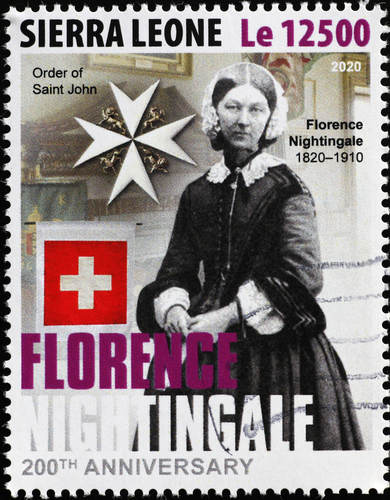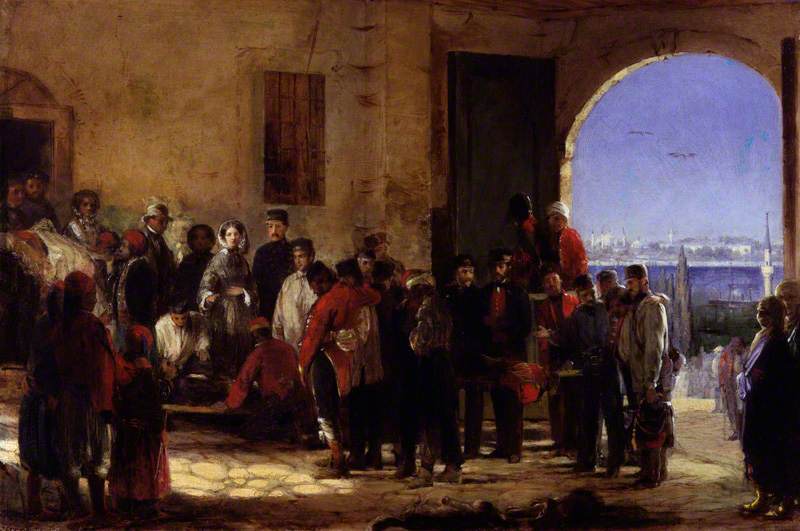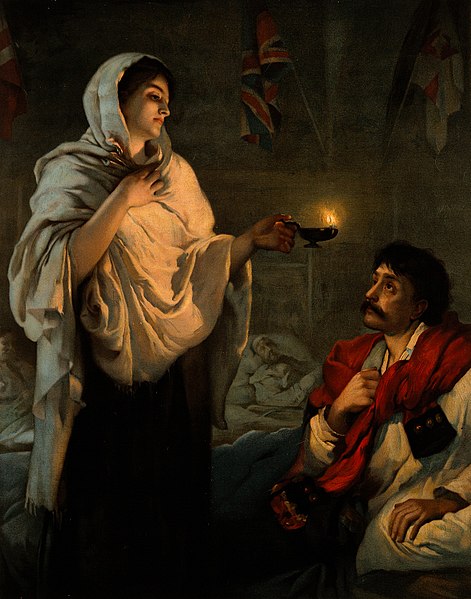Florence Nightingale (1820-1910) was a pioneering nurse and social reformer known for her groundbreaking contributions during the Crimean War, where she significantly improved hospital conditions and reduced mortality rates.
Afterward, she established the Nightingale Training School for Nurses, setting standards for nursing education. An advocate for healthcare reform, she used statistics to highlight the importance of hygiene.
Nightingale authored “Notes on Nursing” and received the Royal Red Cross decoration. Her emphasis on ethics, international influence, and lasting legacy have made her an enduring symbol of dedication in healthcare. She passed away in 1910, leaving a remarkable nursing legacy.
Accomplishments of Florence Nightingale
1. Founder of modern nursing
Florence Nightingale is often referred to as the founder of modern nursing because of her groundbreaking contributions to the field.
In the mid-19th century, nursing was not a respected profession, and hospital conditions were often unsanitary and chaotic.
Also Read: Facts About Florence Nightingale
Nightingale recognized the need for trained nurses and transformed nursing into a skilled and honorable vocation. Her emphasis on providing compassionate care, maintaining hygiene, and upholding ethical standards laid the foundation for the nursing profession as we know it today.

2. Nursing care during the Crimean War
Florence Nightingale’s most famous accomplishments stem from her service during the Crimean War (1853-1856). At the request of the British government, she and a team of nurses were dispatched to the military hospitals in Scutari, Turkey.
Also Read: Timeline of Florence Nightingale
There, they faced deplorable conditions, including overcrowding, inadequate sanitation, and poor medical practices. Nightingale’s dedication to patient care and her implementation of sanitary practices led to a significant reduction in the mortality rate among wounded soldiers.
Her efforts during the war catapulted her to international recognition and made her a symbol of compassion and competence in nursing.
3. Establishment of the Nightingale Training School for Nurses
After her return from the Crimean War, Florence Nightingale recognized the need for formal nursing education to ensure a consistent standard of care. In 1860, she established the Nightingale Training School for Nurses at St. Thomas’ Hospital in London.
This institution was one of the first of its kind and became a model for nursing education worldwide. The school provided rigorous training in nursing skills, hygiene, and ethics, and its graduates went on to work in hospitals around the world.
Nightingale’s school helped professionalize nursing and set the stage for the development of nursing as a respected and well-regulated profession.
4. Advocate for healthcare and sanitation reforms
Florence Nightingale was not only a nurse but also a passionate advocate for healthcare and sanitation reforms. Her experiences in the Crimean War exposed her to the dire state of healthcare facilities and the impact of poor sanitation on patient outcomes.
She used her influence and expertise to campaign for fundamental changes in healthcare practices. Nightingale’s advocacy led to improvements in hospital design, sanitation standards, and the overall quality of patient care.
Her efforts were instrumental in changing the way healthcare institutions operated, making them safer and more efficient.

5. Expert in statistics and data analysis
Florence Nightingale was a pioneer in the use of statistics and data analysis in healthcare. She collected extensive data on patient outcomes, mortality rates, and hospital conditions.
Nightingale’s meticulous record-keeping and statistical analysis allowed her to demonstrate the correlation between sanitation practices and patient survival.
Her famous “coxcomb” or polar area diagram, known as the “Nightingale Rose,” illustrated this connection graphically and effectively.
By using data to support her arguments, Nightingale made a compelling case for sanitation reforms, and her work laid the groundwork for evidence-based healthcare practices.
6. Author of “Notes on Nursing”
One of Florence Nightingale’s most influential accomplishments was the publication of her book, “Notes on Nursing: What It Is and What It Is Not,” in 1859.
This book served as a comprehensive guide for nurses and provided practical advice on nursing care, hygiene, and patient management. It emphasized the importance of cleanliness, fresh air, nutrition, and compassion in nursing practice.
“Notes on Nursing” became a foundational text in the field of nursing and contributed significantly to the professionalization of nursing. It continues to be a valuable resource for nurses and healthcare practitioners, emphasizing the importance of holistic and evidence-based care.
7. First woman to receive the Royal Red Cross decoration
In recognition of her outstanding contributions to nursing and healthcare, Florence Nightingale became the first woman to receive the Royal Red Cross decoration in 1883.
This honor was conferred upon her by Queen Victoria and represented a significant acknowledgment of Nightingale’s dedication and achievements.
The Royal Red Cross decoration is a prestigious award that recognizes exceptional service to the military and nursing, and Nightingale’s receipt of this award underscored her status as a pioneering figure in the field of nursing.

8. International influence on healthcare practices
Florence Nightingale’s impact extended far beyond the borders of the United Kingdom. Her expertise and reputation as a nursing and healthcare reformer led to her advising governments and healthcare organizations worldwide.
Her guidance on nursing education, sanitation practices, and patient care standards played a crucial role in shaping healthcare systems in various countries. Nightingale’s influence contributed to the global development of modern nursing and healthcare practice
9. Emphasis on nursing ethics
Florence Nightingale emphasized the importance of nursing ethics and the moral obligations of nurses toward their patients. She believed that nursing should be guided by a strong ethical foundation that prioritized the well-being, dignity, and rights of patients.
Nightingale’s commitment to ethical nursing practices set a precedent for the profession, emphasizing the importance of compassion, integrity, and patient-centered care. Her ethical principles continue to be a fundamental part of nursing education and practice.
10. Lasting legacy in the nursing profession
Florence Nightingale’s contributions to nursing and healthcare left an enduring legacy that continues to influence the nursing profession to this day.
Her pioneering work in nursing education, patient care, sanitation, and advocacy for healthcare reforms laid the groundwork for modern nursing practice.
Nurses around the world celebrate her legacy every year on May 12th, International Nurses Day, which coincides with her birthday.
Florence Nightingale remains an iconic figure in nursing and a symbol of dedication, compassion, and excellence in healthcare. Her legacy serves as a source of inspiration for current and future generations of nurses and healthcare professionals.
